Patrick McClure
| Patrick McClure, AO | |
|---|---|
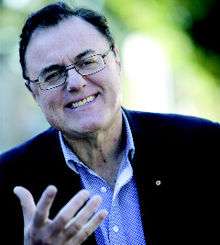 | |
| Born |
March 18, 1949 Auckland, New Zealand |
| Nationality | Australian |
| Occupation | Chief Executive Officer, consultant to government on social policy, company director |
Patrick Joseph McClure, AO (born 1949) chaired the Reference Group on Welfare Reform (2014-2015), advises governments on social policy, is a company director and a former chief executive officer of Mission Australia and the Society of St Vincent de Paul (NSW/ACT). He is a director of the Kincare Group, a commercial in-home aged care provider.
The 2015 final report of the Reference Group on Welfare Reform entitled "A New System for Better Employment and Social Outcomes"[1] proposes an integrated approach to welfare reform across four pillars of reform with an employment focus: a simpler and sustainable income support system, building individual and family capability, engaging with employers and building community capacity.
Education and early career
McClure was born in Auckland, New Zealand and migrated with his parents and family to Australia at age 14 years.[2] He had commenced his secondary education at St Peter's College, Auckland and completed it at Waverley College, Sydney. In 1968, he joined the Franciscans (Order of Friars Minor),[3] was ordained a priest in 1975 and resigned from the ministry in 1977.[2] His experience of working with homeless people and the influence of a pioneer in microfinance led to his career in the social purpose sector.[4]
He became a director of Amnesty International (1978-1988), working with refugees and coordinating global campaigns against human rights abuses.
He was founder and chair of Second Harvest (Australia), a social enterprise providing low cost food to people on low income (1978-1989), and awarded a Churchill Fellowship (1989) to study social enterprises in the USA, Canada and the UK.[5]
He worked as director of Migrant Services and area manager, Social Work, in the Department of Social Security (now the Department of Social Services) in Perth and Sydney (1985-1991).
McClure has a Master of Arts (Public Policy) from Murdoch University, WA (1987-1991),[2] and a Bachelor of Social Work (Distinction) from Curtin University, WA (1978-1981). He also has a Diploma in Theological and Pastoral Studies from Yarra Theological Union, Vic (1975).
Career
Chief Executive Officer, Society of St Vincent de Paul (NSW/ACT) (1992-1996)
McClure was CEO of the Society of St Vincent de Paul (NSW/ACT) during a period of major organisation reform. The Society had a budget of $375m, providing housing, youth, family services and social assistance to over 500,000 disadvantaged people each year. During his tenure, he was also a member of the NSW Government Drought Assistance Committee, which distributed $80 million in drought assistance to rural households across NSW in 1995-1996.[3]
Chief Executive Officer, Mission Australia (1997-2006)
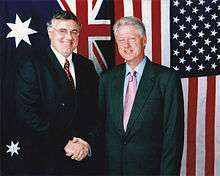
During McClure’s tenure as CEO of Mission Australia, the organisation grew from separate state-based entities with annual revenue of $50m, to a national organisation with annual revenue exceeding $300m and 3000 staff providing employment, training, housing and other services to over 200,000 disadvantaged youth, adults, families and children.[2]
The organisation became a major provider of employment services in the privatised Job Network. Mission Australia was also awarded the Prime Minister's Community Business Partnership Award in 2001.[3]
Mission Australia acquired a one-third shareholding in Working Links, a UK employment company, in 2005. In the same year, the organisation opened the Mission Australia Centre in Surry Hills, Sydney, providing integrated services for homeless people.
Chair, Reference Group on Welfare Reform (1999-2000)
McClure was appointed chair of the Australian government’s Reference Group on Welfare Reform (1999-2000). The final report, “Participation Support for a More Equitable Society”[6] (known as the McClure Report) outlined a blueprint for welfare reform.[7][8] In the 2001 Federal Budget, the Australian Government committed $1.7 billion over four years to implement recommendations of the report called Australians Working Together.[8]
Chief Executive Officer, Macquarie Capital Retirement Villages Group (2006-2008)
McClure was CEO of Macquarie Capital RVG, which raised $850m of institutional funds for investment in retirement villages in Australia and New Zealand.
Ethics Fellow, Centre for Social Impact, UNSW (2008-2010)
McClure was appointed Ethics Fellow at the Centre for Social Impact, University of New South Wales. Through workshops, conferences and articles, McClure presented applied ethics and an ethical decision-making framework for Third Sector organisations.[9]
Chair, Reference Group on Welfare Reform (2013-2015)
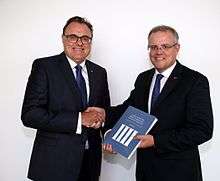
In December 2013, Minister for Social Services Kevin Andrews announced that McClure would chair a Reference Group on Welfare Reform. An interim report was released on June 29, 2014,[1] followed by roundtables with 175 key stakeholders in all states and territories, consultations with 55 people on income support, 271 formal submissions and 231 online comments.
The final report titled “A New System for Better Employment and Social Outcomes”[1] was launched in Canberra on 23 February 2015 by Patrick McClure and the Minister for Social Services Scott Morrison. It proposed an integrated approach across four pillars of reform with an employment focus: a simpler and more sustainable income support system, building individual and family capacity, engaging employers, and building community capacity.[8]
Key recommendations included: reducing the current complex and inefficient system of 20 payments and 55 supplements to five payments and four categories of supplements; a passport to work, enabling people to move easily between employment and the income support system; a new ICT system to drive efficiencies in the new income support system; an investment approach with early intervention services focusing on groups most at risk of long term welfare dependence; a jobs plan for people with disabilities and mental health conditions; and the use of social impact bonds to attract private investment to address social problems.[1]
Since the 2015 budget, the Australian government has allocated funds for a new ICT system, a prerequisite for introducing a simpler income support system; the Priority Investment Approach contracting PwC to complete annual actuarial valuations of groups at risk of lifetime welfare dependence; allocations to organisations from the $100m Try, Test and Learn Fund; simplification of child and youth payments; support for social impact investment in affordable housing;[1] and a new JobSeeker Payment to replace or consolidate seven existing payments.[1]
Current roles
McClure is chair, Review Panel of the Australian Charities and Not-for-Profits Commission (ACNC) Acts.[10]
He a director of the Institute of Strategic Management, Sydney.[11]
He is a non-executive director of the Kincare Group.[12]
He is a member of the NSW Government Social Impact Investment Expert Advisory Group.[13]
He is a selector, Community Services Panel for the Churchill Trust (NSW).
Government boards
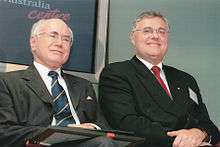
- Delegate to the Australian Government's Australia 2020 Summit (2008)
- Commissioner of the Australian Fair Pay Commission (2006-2009)
- Member of the Prime Minister's Community Business Partnership Board (1998-2007)
- Chair of the OECD Local Employment and Economic Development Forum on Social Innovation (2004-2006)
- Deputy Chair of the Welfare to Work Consultative Forum (2005-2006)
- Member of the Board for A New Tax System (1999-2000)
Honours
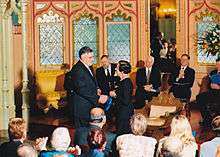

- Officer of the Order of Australia (AO) for "services to the community through the development of social capital policy initiatives, and in the delivery of programs addressing social justice, welfare support, health and employment generation issues" (2003)[14]
- Australian Centenary of Federation Medal for "service to the community" (2001)[15]
- Distinguished Alumni Award, Murdoch University, WA for significant contribution to his profession and the community (2016)[16]
- Australian Financial Review True Leader (2005)
- Equity Trustees EQT CEO Award for Lifetime Achievement recognising "leadership excellence in the non-profit sector” (2002)[17]
Notes
- 1 2 3 4 5 6 "A New System for Better Employment and Social Outcomes – Full version of the Final Report | Department of Social Services, Australian Government". Dss.gov.au. 2015-02-25. Retrieved 2016-09-16.
- 1 2 3 4 McClure, Patrick (2011). Seize the Day: From Priest to CEO. Sydney, Australia: Longueville Books. pp. 44–66. ISBN 9781920681777.
- 1 2 Damir Govorcin, (23 February 2003), Conversation: Patrick McClure, head of Mission Australia Archived 14 May 2013 at the Wayback Machine., 'My faith and passion come together' here, The Catholic Weekly, Sydney
- ↑ McClure, Patrick (2011). Seize The Day: From Priest to CEO. Sydney, Australia: Longueville Books. ISBN 9781920681777.
- ↑ Patrick McClure 1989 Fellowship Archived 6 March 2016 at the Wayback Machine., To visit and study the operation of non-profit community enterprises involved in the provision of food for people on low income – USA, UK, Canada, Churchill Memorial Trust website
- ↑ McClure, Patrick; Reference Group on Welfare Reform (2000), Participation support for a more equitable society : final report of the Reference Group on Welfare Reform (PDF), Department of Family and Community Services
- ↑ Michelle Grattan wrote about the final report in the Sydney Morning Herald of 17 August 2000: "Mission Australia's Patrick McClure has scored a trifecta. Government, Labor and Democrats all had positive things to say about the inquiry's blueprint for welfare change ... The strength of the McClure report is that it is not driven by a narrow right or left ideology. Indeed if you ask whether the report comes from the Right or the Left in its approach, the answer is both." Michelle Grattan, (17 August 2000), Mutual obligation is here to stay let the challenge of change begin, Sydney Morning Herald, Sydney, p. 4 Archived 21 August 2015 at the Wayback Machine.; accessed 21 November 2013
- 1 2 3 Australia. Department of Family and Community Services (2001), Australians working together : helping people to move forward, Dept. of Family and Community Services, retrieved 11 December 2017
- ↑ Patrick McClure, Opinion: Profit and childcare don't mix Archived 22 August 2015 at the Wayback Machine. The Centre for Social Impact
- ↑ "Review of Australian Charities and Not-for-profits Commission (ACNC) Legislation". Australian Government, The Treasury. Retrieved December 21, 2017.
- ↑ "Governance - Institute of Strategic Management". Ism.nsw.edu.au. 2014-06-20. Retrieved 2016-09-16.
- ↑ "About Us - Our Board of Directors - Australia". KinCare.com.au. Retrieved 2016-09-16.
- ↑ Australian Government: Office of Social Impact Investment. "Social Impact Investment Knowledge Hub". Archived from the original on 26 April 2016. Retrieved 10 December 2017.
- ↑ "It's an Honour - Honours - Search Australian Honours". Itsanhonour.gov.au. 2003-01-26. Retrieved 2016-09-16.
- ↑ "It's an Honour - Honours - Search Australian Honours". Itsanhonour.gov.au. 2001-01-01. Retrieved 2016-09-16.
- ↑ "2016 Murdoch University Distinguished Alumni Awards Winners". Murdoch University.
- ↑ thinking.com.au. "EventOFFICE - Awards Portal". Awardsoffice.com.au. Retrieved 2016-09-16.
References
- McClure, Patrick (2011), Seize The Day: From Priest to CEO (1st ed.), Sydney, Australia: Longueville Books, ISBN 9781920681777
- St Peter's College Magazine 1960–1963
External links
- Welfare Reform article published in The Australian Financial Review – July 24, 2016 The Australian Financial Review
- Welfare Reform article published in The Weekend Australian – April 16, 2016 The Weekend Australian
- Patrick McClure joins Alan Jones to discuss welfare reform – March 10, 2015 2GB Radio
- Patrick McClure talks about welfare reform with the intergenerational report – March 5, 2015 2GB Radio
- Patrick McClure talks about his proposed changes to the welfare system – February 25, 2015 2GB Radio
- Welfare review by Patrick McClure lays out plan for simplified payments, tightening eligibility for disability support – February 25 2015, abc.net.au